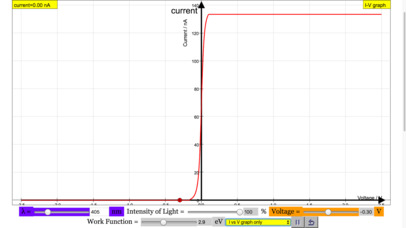
PhotoElectric Effect Simulator
About
An open source physics at Singapore simulation based on codes written by Fu-Kwun Hwang, Loo Kang WEE, Tze Kwang Leong.
more resources can be found on the supporting URL
Introduction
The photoelectric effect or photoemission (given by Albert Einstein) is the production of electrons or other free carriers when light is shone onto a material. Electrons emitted in this manner can be called photoelectrons.
Electrons are dislodged only by the impingement of photons when those photons reach or exceed a threshold frequency (energy). Below that threshold, no electrons are emitted from the metal regardless of the light intensity or the length of time of exposure to the light. To make sense of the fact that light can eject electrons even if its intensity is low, Albert Einstein proposed that a beam of light is not a wave propagating through space, but rather a collection of discrete wave packets (photons), each with energy hf. This shed light on Max Plancks previous discovery of the Planck relation (E = hf) linking energy (E) and frequency (f) as arising from quantization of energy. The factor h is known as the Planck constant.
n 1905, Albert Einstein published a paper that explained experimental data from the photoelectric effect as the result of light energy being carried in discrete quantized packets. This discovery led to the quantum revolution. In 1914, Robert Millikans experiment confirmed Einsteins law on photoelectric effect. Einstein was awarded the Nobel Prize in 1921 for "his discovery of the law of the photoelectric effect",and Millikan was awarded the Nobel Prize in 1923 for "his work on the elementary charge of electricity and on the photoelectric effect"
Interesting Fact
This simulation has been customised for A level Physics education, and it is an open source project.
Acknowledgement
My sincere gratitude for the significant contributions of Francisco Esquembre, Fu-Kwun Hwang, Wolfgang Christian, Félix Jesús Garcia Clemente, Anne Cox, Andrew Duffy, Todd Timberlake and many more in the Open Source Physics community.



